A unique talent for singing, song-writing, composing and interpretation and an ever-evolving sound enhanced by her ability to perform in a bold, gutsy and passionate manner, make Carmen Consoli an artist impossible to pigeon-hole.
Born in Catania, Sicily, Carmen was introduced to music from an early age: she began playing electric guitar aged 9 and at 14 she was already performing with a rock-blues cover band called Moon Dog’s Party. After becoming involved in the blues circuit in Rome she returned to Catania, where she recorded her first album, “Due parole” (A few words): a fascinating collection of pop-rock songs with an electric/acoustic feel, including “Amore di plastica”, she performed at the 1996 Sanremo Song Festival where she captured the attention of music critics and the public. A lengthy Italian tour followed plus her first appearances at major music events (including the 1st May concert at Sonoria in Rome, the Recanati Awards and the Tenco Awards).
In 1997 Carmen returned to Sanremo with “Confusa e Felice” (Confused and Happy), that launched her new album of the same name. This album was more electric and much rougher in sound than the previous one. It contained the song “Per niente stanca”, and confirmed her unquestionable talent. It was an immediate success with sales of over 120,000 albums and a sold out tour.
The following year, 1998, Carmen’s third album was released, “Mediamente isterica” (Averagely Hysterical): a concentration of energy with cutting lyrics and a powerful sound full of purist melodies from which no less than two tours ensued.
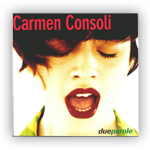
From her first album,
“Due parole”,
“Amore di plastica”, proposed
at Sanremo Festival 1996
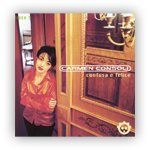
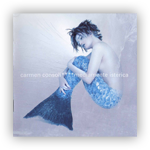
The artist returned to the forefront in 2000 with the album “Stato di necessità” (State of Necessity), launched at the Sanremo Festival with the single «In bianco e nero»: that Spring the song became the most played track on radio, while the summer was dominated by the bossanova rhythm of “Parole di Burro” (Buttery Words). After an extremely successful summer tour, in the autumn Carmen hit the road once more with new acoustic arrangements of her songs, while the moving “L’ultimo bacio” became the theme song of the eponymously titled film by Gabriele Muccino (in which Carmen also played a cameo role). As a result, the album bounced back to the top of the charts and sold more than 200.000 copies. This exciting period was sealed by a succession of awards, including two Italian Music Awards, two Premi Italiani della Musica and the 'Nastro d'Argento' from the Taormina Film Fest Awards.
In 2001 “Stato di necessità” was released in France with a French version of two songs and a cover of a Serge Gainsbourg song produced by Henri Salvador. The summer saw Carmen performing at the Greek amphitheatre in Taormina accompanied by the Orchestra of the Vittorio Emanuele Theatre of Messina conducted by Paolo Buonvino. The event spawned the album “L’anfiteatro e la bambina impertinente” (The Amphitheatre and the Impertinent Little Girl), and two more live performances in two completely different settings: Milan’s Leoncavallo Youth and Social Centre and Rome’s Santa Cecilia Academy of Music, establishing her as an artist of incomparable talent.
The time was ripe for Giunti Publishers to release her first official biography, Quello che sento – Il mondo, i pensieri, la musica di Carmen Consoli (What I feel – The world, thoughts, and music of Carmen Consoli).
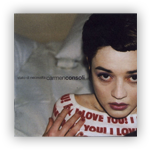
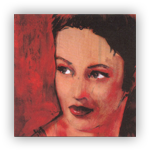
2002 was the year of the multi-faceted, sophisticated album “L’eccezione” (The Exception), a special edition of which was also internationally released including English versions of several songs and other previously unreleased tracks. The album was followed by an extensive tour of Europe.
In 2003 came Carmen’s very first performance at Rome’s Olympic Stadium as well as many more accolades, the “Civitanova Poesia” and “Grinzane Cavour” awards, and the release of “Un sorso in più - Live a MTV Supersonic” (One More Sip – Live at MTV Supersonic), recorded during “MTV Day”. But 2003 also marked another important step in the artist’s career as she became a producer in her own right and also set up her own, personally run label “Due Parole”. The label’s first release was “La Camera Migliore” (The Best Room).
In March 2004 she was the first Italian artist to take part in the “South By South West Festival” in Austin, Texas. A few months later, in May 2004, she was one of the artists invited to take part in “We Are The Future”, a humanitarian initiative organized by Quincy Jones, held in Rome and broadcast worldwide, and - at the end of 2004 – she undertook a club tour performing a repertoire of blues and rock-blues covers under the name Moon Dog’s Party.
On 6th February 2005 she was the only Italian artist to go to Ethiopia and perform at the celebrations commemorating Bob Marley, organized by Rita Marley. On that occasion Carmen sang a duet with Angelique Kidjo, while in April she returned to the US for another series of concerts (Miami, Chicago, New York) which consolidated her appeal with overseas audiences.
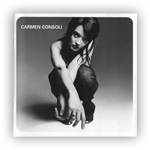

In 2005 she collaborated with Goran Bregovic co-penning the title track to the Roberto Faenza film “I Giorni dell’Abbandono”.
On 12th May 2006 "Eva Contro Eva" was released simultaneously in Italy, Spain, Germany, France, Holland and Switzerland. In this album Carmen combines lyrics steeped in tradition and history with stories of women poised between the ancient and the modern; each song a small story that hails back to Verga and the neorealism of the provincial South. The album contains collaborations with Angelique Kidjo in “Madre Terra” and Goran Bregovic in “Il Pendio Dell’Abbandono”. The album was followed by a tour of Italy and Europe and at the end of September she was back touring the US and Canada: Chicago, Toronto, Philadelphia, Northampton, Madison with no less than three concerts, all sold out, in New York.
In Winter 2006/2007 Carmen staged a concert which made a highly emotional impact and which she also took to Paris: “In Teatro” in collaboration with Emma Dante. The music and characters depicting Sicily as an island suspended in time, were reinterpreted by the Sicilian author and theatrical director, who also wrote three scripts recited by Simona Malato. The instruments used drew from both Sicilian and diverse Mediterranean cultures.
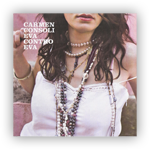
“Eva Contro Eva”.
published simultaneously
in Italy, Spain, Germany,
France, Hollande and Switzerland
Also in 2007, she returned to New York where she had a headline slot at “Joe’s Pub in the Park” the well-known Summer Festival held in New York’s Central Park, she performed in Toronto and, for the first time, in Montreal, to excellent audience response. She returned to the US again in March 2008, for a tour of renowned theaters such as the Grosvenor Auditorium in Washington, the Remis Auditorium at the Museum of Fine Arts in Boston and New York’s Mainstage Theater, where the ‘New York Times’ critic John Pareles wrote a wonderful review expressing approval and praise.
In 2008 Carmen wrote her first original soundtrack, the music to the film “L’uomo che ama” (The Man Who Loves), by Maria Sole Tognazzi starring Monica Bellucci and Pier Francesco Favino. Given the orchestral scores and instrumental tracks, Carmen decided to give the main role in the soundtrack to the viola, a contralto instrument just like her voice.
That same year, re-released exactly ten years from the date of its first release, came a new version of “Mediamente Isterica”, Carmen’s rockiest album which she calls the “album of her life”.
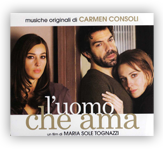
In 2008 Carmen compose
her first original soundtrack
that of the movie
“L'uomo che ama”
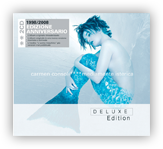
In 2009 came “Elettra” (Electra), where Carmen, inspired by the heroic deeds of the mythological character from which the album takes its name, explores the multifaceted nature of women, blending rock with electric sounds and with South American, Northern European and Balkan rhythms. The album contains lyrics in Italian and Sicilian and there is also a song written and performed with Franco Battiato, “Marie ti amiamo” (Marie We Love You), with verses in Arab and French. The song “Mio zio”, which tells the story of domestic abuse, was awarded the 2010 Amnesty International Italy prize and Carmen was also named Ambassador for Telefono Rosa (women’s aid helpline). The album won the Tenco Best Album of the Year Prize (she was the first woman to receive this award).
At the beginning of 2010 Carmen embarked on a new sold out tour of the US and Canada performing solo and accompanying herself on the guitar, garnering more accolades from the American press, while in Italy her live performances took the form of two distinct, simultaneous tours “Ventunodiecimilatrenta”, a rock tour - with her on bass for the very first time - and “Elettra”, the acoustic tour. On 16th November 2010, her first ‘greatest hits’ album was released. It was entitled “Per niente stanca”, and contained two previously unreleased tracks “Guarda l’alba” (music: Tiziano Ferro, lyrics: Carmen Consoli) and “AAA cercasi” (music: Mauro Lusini, lyrics: Carmen Consoli). In the years that followed Carmen has concentrated on producing and developing new projects for her own label, Narciso. Among these are Malmaritate – a thought-provoking album and tour on violence against women and all kinds of abuse-related issues – and Luca Madonia – whose brand new, soon-to-be released album is a portrait of our epoch, ranging from the poetic and dreamy to the raw and contemplative.
On 20th January 2015 Carmen Consoli released her new album “L'abitudine di tornare” (Coming Back is a Habit).
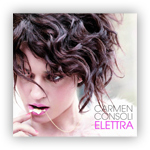
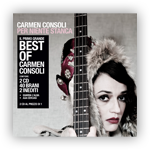
The first "best of",
“Per niente stanca”
containing the two unpublished
“Guarda l'alba” and “AAA cercasi”